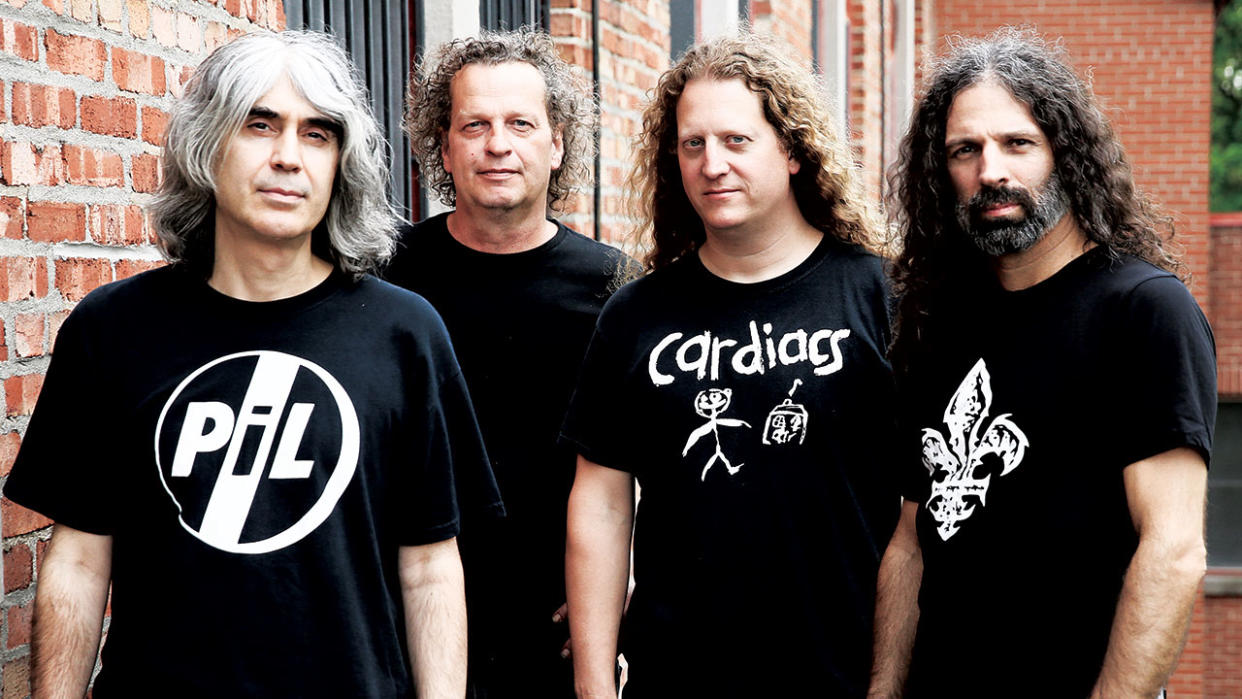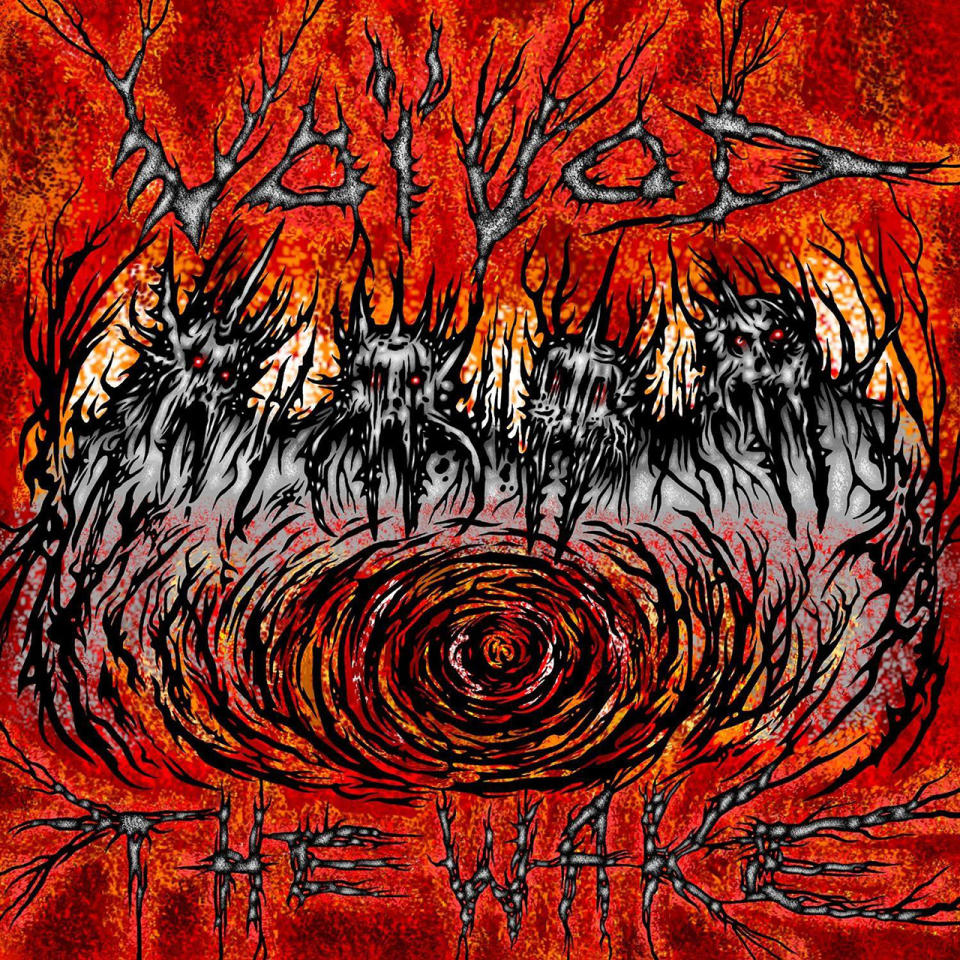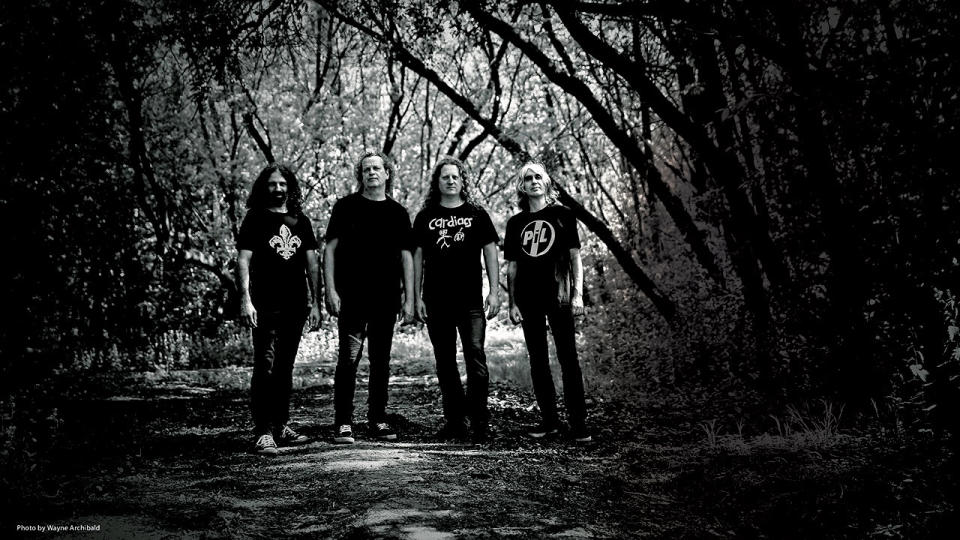“To get an award from the prog world meant a lot to me because prog rock was in our blood when we started." The story of Voivod and The Wake

Voivod celebrated their 35th anniversary with by releasing their fourteenth studio album, The Wake, which would go on to win the band a celebrated Juno Award in their native Canada. Prog chatted with them about the album and their recent success at the Prog Awards back in 2018.
Over the past 10 years, Voivod have been undergoing a renaissance. Or, to be more precise, another renaissance. Constant change is nothing new for the shapeshifting Quebec entity that have been reinventing themselves perennially, adapting to obstacles and mutating depending on deviations in their environmental conditions. But this time it’s different. This time, a wider world is taking notice.
Put it down to tenacious longevity, battling numerous personnel changes and personal tragedy while weathering the storms of transient trends. Maybe it’s last year’s reissue campaign of deluxe editions of the seminal first four albums. Being championed by no less a figure in the mainstream rock world than Dave Grohl can’t have hurt, either. Perhaps it’s the sheer love of making music, of tireless touring, travelling and getting their unique style of sci-fi-inspired prog thrash in front of as many people as possible.
It’s all of the above and more.
Three years in the making, new album The Wake is their best and most progressive since the creative zenith of the late 80s and early 90s. It has been receiving near-universal acclaim. Now, on their 35th anniversary, the time feels ripe for another rebirth and a reappraisal of the career of one of the leading architects of progressive metal.
“I hope so,” admits Michel ‘Away’ Langevin, Voivod’s drummer and only constant member. “The last time we had reviews like this were around Nothingface, Angel Rat and The Outer Limits, so it’s quite a thrill. I think it’s going to open the doors for us to play more festivals and also we’ll probably be able to open for bigger bands which is always cool.”
In 1990 they were opening for Rush, whose legendary producer Terry Brown oversaw 1991’s Angel Rat. The support acts on the US tour for Nothingface were Soundgarden and Faith No More. Seemingly predestined to remain the ultimate underground band, Voivod have been dipping in and out of the record-buying public’s radar for 35 years, though a group called the Iron Gang follow them with conviction. Voivod have inspired hordes of musicians and are held in near-reverential stature far out of proportion of their modest sales figures.

Langevin reveals that although the tide may be turning in their favour, “it’s not something that we think about that much.
“We’ve been underground for so many years,” he confesses, “that we are resigned to do the touring we do and have the sales that we have.”
One week after The Wake’s release and in the midst of a European jaunt, Langevin is able to gauge reactions first-hand on a nightly basis. “It’s being received wonderfully,” he beams. “We’re pretty excited because it’s always a bit of a stress, how people are going to react. We worked on it for three years so we’re very happy with how the reviews are and also how the people into Voivod are reacting to it. It’s absolutely great! It’s hard for us to take a step back and judge the work and the art. We were hoping people would notice the amount of work we put into it. All the reviews are talking about that and all the people we meet at the shows are too. It paid off. We’re super-excited!”
Last year the band were presented with a gong in the Visionary category at the Prog Awards. What did that mean to them?
“Most people think about Voivod as a metal band,” Langevin says. “To get an award from the prog world meant a lot to me because prog rock was so huge in Quebec in the 70s – it was in our blood when we started. Even obscure krautrock: Faust, Can, Amon Düül II. I met Peter Hammill [at the awards], which was quite amazing. I would say that Van der Graaf is still my favourite band of all time. He was talking to me in French, which is great.” Langevin laughs: “I also met Carl Palmer and Steve Hackett so I was like a fanboy!”
If Voivod are riding a wave at the moment, they’ve earned it the hard way. After navigating choppy waters in the 90s when two of the four founder members left, they reconfigured as a three-piece until they broke up in 2001.
Newly adrift ex-Metallica bassist Jason Newsted joined in 2002, giving them street cred and turning the spotlight on them briefly, exposing them to a younger, more mainstream metal crowd. Then, in 2005, tragedy struck. Leading light, main writer and visionary guitarist Denis ‘Piggy’ D’Amour died at 45 after being diagnosed with colon cancer.
A unique and groundbreaking musician, Piggy’s loss created a chasm that seemed almost unbridgeable. He had formed the band when looking for partners in crime to fuse his inspirations, from prog to punk, metal to classical.
“He went to school studying violin and had a bit of a hard time with the school, being told not to play like that, play like this, so eventually decided to drop out and try his luck playing music,” explains Langevin.
“He couldn’t find anybody. He even moved to Toronto at one point to try to find people but couldn’t, then came back up north to Quebec where we lived. He found me first, and then we found Blacky [Jean‑Yves Thériault, bass] and then Snake [Denis Bélanger, vocals].
“We were 17, he was 21 and we thought he was pretty old,” he laughs, “but he was our mentor. He had a huge vinyl collection and got us into a lot of different types of music. We were mainly into metal and punk and the commercial side of prog rock – Supertramp and Pink Floyd. He was heavily into Gentle Giant and stuff like that. He really was our teacher.”
D’Amour’s approach to composition was so esoteric that his instantly recognisable signature guitar voicings have their own name: ‘Piggy chords’. It would take an enormous talent (and not a little of that hitherto elusive luck) to fill the void left by D’Amour’s passing. They found it in fellow Québécois, Daniel ‘Chewy’ Mongrain from tech metal band Martyr.

Mongrain is a long-time admirer of the band, capable of recreating D’Amour’s parts not only with feel and accuracy but with sensitivity to the legacy. He has been embraced by the Iron Gang. Mongrain is a music theorist with a degree in Jazz Interpretation from the University of Montreal, so as a composer he can continue the sonic experiments that form this music’s DNA.
From 2013’s Target Earth, it was evident that Voivod were no tribute act to themselves but would keep forging ahead, inventing new concoctions like a mad professor in a prog lab. Travelling forward in time to 2018 via 2016’s Post Society EP, the writing evolves, building in confidence and having the courage of its convictions. Taking chances. Always moving.
One aspect of that progressive mentality is the influence of 20th-century classical music on several of the new songs on The Wake. Always Moving, Sonic Mycelium and The End Of Dormancy are clearly inspired by Stravinsky’s The Rite Of Spring and Holst’s Mars, The Bringer Of War.
“It’s very cinematographic,” says Langevin. “Piggy introduced us to modern composers. Some of it was pulled from soundtracks like The Shining. Penderecki. Bartók was my favourite. Shostakovich. He included a lot of that in the music. I think Chewy is trying to keep that essence intact. He decided to invite a string quartet and wrote a piece for them and directed them in the studio. It fits.”
Chewy has brought with him bassist Dominique ‘Rocky’ Laroche. Friends since their teens, their paths crossed before, unbeknown to them, at a Voivod gig of all places. Langevin says, “Rocky’s first show was Voivod, like Chewy. They didn’t know each other but they were both at the same show. It was the first show for Nothingface.”
The bassist is also an ex-student of music and brings jazz chops to the table, something the veteran punk and metal drummer has had to accommodate in his own playing.
“Rocky and Chewy have a sort of fusion style with a lot of question and answer between the bass and guitar. I have to play around that. It’s cool for me,” he says. “With the new formation it’s almost like jazz metal. I think it’s probably the direction we’re going to head for in terms of intricacy. It’s going to be quite a challenge to push it forward but we’ll try to do so.”
Langevin is clearly excited about the future. With young blood on board there are new opportunities for experimentation and progress. Technology has opened a door into a new writing and recording process.
“We’ve been touring a lot the last couple of years and we found a way to write music in the bus and backstage on a computer, so that helped a lot. Now that we’ve found a way of working we might be able to release more albums more quickly.”
The future holds several new projects which are in the incubation stages. The next batch of reissues from Nothingface to The Outer Limits is being plotted. A long-mooted documentary film is edging closer to production. Canadian filmmaker Sam Dunn, who directed Rush: Beyond the Lighted Stage and Iron Maiden: Flight
666, is at the helm.
Langevin is planning two more books of his artwork: a follow-up to 2009’s Worlds Away and a collection of drawings. “In every city I try to draw,” he says, “to represent my impression of the city at the end of the night after the show. My next book is going to be the art I did on the road since we reformed in 2008. It’s a lot of drawings!”
Langevin’s figure of the Voivod adorns the record sleeves in the style of Iron Maiden’s Eddie. This vampiric tech-warlord travels the galaxies, encountering dystopian societies and ravaged worlds in the midst of post‑apocalyptic environmental decay. This may sound familiar to fans of Magma, who created a mythos around an exodus from a dying Earth to colonise the planet Kobaïa. “Christian Vander is a huge influence,” Langevin says. “Not only his drumming, but his concept and logo.”
Art is a passion Langevin has harboured since the mid-70s. It provides a creative outlet away from the band while adding an extra dimension to their albums. “I will always draw,” he asserts. “I know we’re going to be recording music forever. In terms of touring, it might slow down eventually, but I will always have my art to rely on. It’s a great life. I don’t take it for granted.
“Whenever I’m not touring or recording I do a lot of art for other bands or tattoo designs or book covers, which is great because when I was a kid, my first inspiration were the sci‑fi books at the library. I would copy the covers.”
As Voivod celebrate their 35th year, they in turn are influencing a new generation. “We have mixed crowds,” says Langevin. “Yesterday in the front row we had a kid, he was 12 years old. Beside him was a lady who was 78 years old! Snake asked them their age. The crowd cheered. It was very cool!”
Of course, there are always the diehards who have been there since the early thrash days and supported the band through myriad stylistic and line‑up changes. You don’t get to be one of the most revered cult bands in the world without earning and inspiring that kind of loyalty.
“People into Voivod are really into Voivod,” says Langevin. “They have to express it. It’s such a great feeling for us. I actually can’t stop playing around the planet and seeing my friends over and over and new people. It really keeps me going and it’s one of the reasons why I keep playing music. It’s the travels. The travels are amazing.”
Always moving.
Keep watching the skies. You’ll see perpetual change.

